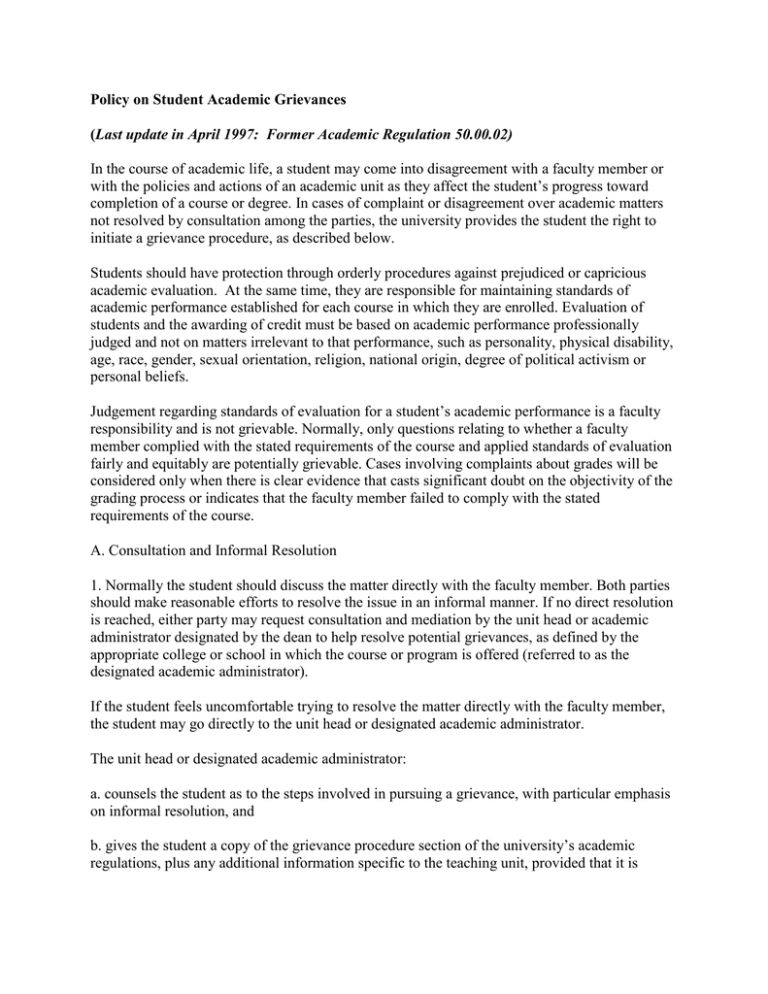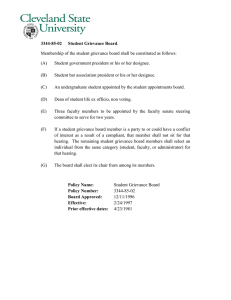Policy on Student Academic Grievances
advertisement

Policy on Student Academic Grievances (Last update in April 1997: Former Academic Regulation 50.00.02) In the course of academic life, a student may come into disagreement with a faculty member or with the policies and actions of an academic unit as they affect the student’s progress toward completion of a course or degree. In cases of complaint or disagreement over academic matters not resolved by consultation among the parties, the university provides the student the right to initiate a grievance procedure, as described below. Students should have protection through orderly procedures against prejudiced or capricious academic evaluation. At the same time, they are responsible for maintaining standards of academic performance established for each course in which they are enrolled. Evaluation of students and the awarding of credit must be based on academic performance professionally judged and not on matters irrelevant to that performance, such as personality, physical disability, age, race, gender, sexual orientation, religion, national origin, degree of political activism or personal beliefs. Judgement regarding standards of evaluation for a student’s academic performance is a faculty responsibility and is not grievable. Normally, only questions relating to whether a faculty member complied with the stated requirements of the course and applied standards of evaluation fairly and equitably are potentially grievable. Cases involving complaints about grades will be considered only when there is clear evidence that casts significant doubt on the objectivity of the grading process or indicates that the faculty member failed to comply with the stated requirements of the course. A. Consultation and Informal Resolution 1. Normally the student should discuss the matter directly with the faculty member. Both parties should make reasonable efforts to resolve the issue in an informal manner. If no direct resolution is reached, either party may request consultation and mediation by the unit head or academic administrator designated by the dean to help resolve potential grievances, as defined by the appropriate college or school in which the course or program is offered (referred to as the designated academic administrator). If the student feels uncomfortable trying to resolve the matter directly with the faculty member, the student may go directly to the unit head or designated academic administrator. The unit head or designated academic administrator: a. counsels the student as to the steps involved in pursuing a grievance, with particular emphasis on informal resolution, and b. gives the student a copy of the grievance procedure section of the university’s academic regulations, plus any additional information specific to the teaching unit, provided that it is consistent with the university’s academic regulations, and notifies the faculty member immediately. If the process of consultation and informal resolution fails, then formal grievance proceedings may begin. B. Formal Process 1. If the student, after completing the above steps, remains unsatisfied, then he/she may file a formal grievance by submitting a written complaint to the head of the teaching unit or other academic administrator designated to supervise the grievance procedure. Jurisdiction over the grievance procedure resides in the teaching unit responsible for the course. The complaint, plus any supporting documents, shall supply full detail regarding the nature of the complaint and the remedy sought. The complaint shall indicate the dates on which attempts at informal resolution took place. To ensure that the school/college responsible for a student’s enrollment in the university is aware that a grievance has been filed, the teaching unit which has jurisdiction over the grievance will provide the dean of the student’s school/college with written notification of the filing. The faculty member against whom the grievance has been filed will also be notified. 2. A grievance must be filed within thirty (30) working days of the occurrence or discovery of the alleged incident, but in no instance later than February 15 for a grievance arising during the preceding fall semester or later than October 1 for a grievance arising during the preceding spring or summer semesters, unless the basis for the complaint falls under the university’s Discrimination and Discriminatory Harassment Policy. In such cases, an individual will have one year from the date of discovery to file a grievance. Senate action and Provost approval, May 1999. 3. Each teaching unit shall have a standing grievance committee, consisting of at least three faculty members for each student member, that can be convened to hear any complaint submitted. Provision shall be made for an undergraduate student committee member for undergraduate cases, and a graduate student committee member for graduate cases. If a member of the grievance committee is a party to a complaint, the unit head shall appoint a substitute faculty member or student member who has no involvement in the case. 4. Upon receipt of a complaint, the unit head or responsible administrator shall transmit the complaint to the grievance committee and simultaneously to the faculty member within three (3) working days, and shall assure that a hearing takes place within ten class days during the fall and spring semesters, or as soon as possible at other times. All parties shall be informed in writing of the time and place of the hearing. Prior to the hearing, the committee shall obtain additional material it deems relevant. All parties shall receive copies of all relevant documents within the three working days and each party has the right to respond in writing. The grievance committee shall review in detail the complaint, the remedy sought, and all supporting documentation. 5. The student and the faculty member or other person(s) named in the grievance shall have the right to an oral hearing before the committee. The student may waive in writing her/his right to appear for the hearing. Otherwise, if the student fails to appear for a hearing, the committee must dismiss the case with prejudice unless the student can demonstrate that he or she was detained for reasons beyond his or her control. If the faculty member or his/her responding party does not appear, the hearing may proceed in that person’s absence. The committee shall have the right to question the student filing the grievance and the faculty member or other person(s) named. 6. Parties to a grievance shall have an opportunity to state their cases, present evidence, designate witnesses, ask questions and present a closing statement. Additional witnesses may be called at the discretion of the committee. Either party may be accompanied by an advisor, but the advisor may not address the hearing directly. Because the purpose of the grievance process is to provide a fair review rather than a formal legal proceeding, participation of persons acting as legal counsel in the grievance process is not permitted. All hearings shall be closed to the public unless both parties agree in writing to an open hearing. A record of the hearings and any decisions of the committee shall be maintained in accordance with applicable laws. 7. In cases involving allegation of improper evaluation, the student must demonstrate clearly and convincingly that the evaluation was not objective or that the faculty member did not comply with the syllabus or other stated requirements of the course. If the only question is as to the validity of the judgement of the faculty member regarding the merit of the academic performance of the student, the case will be dismissed. In such a case, the committee will not read the papers or examinations of the student to judge whether they have been fairly graded. It is not the task of the committee to judge the academic standards used by faculty members in grading students. 8. Committee deliberations shall take place in closed sessions. Committee decisions in support of the grievance must be made by majority vote of all members present. Three quarters of the members constitute a quorum. 9. Within one week after the hearing is concluded, the committee shall render a decision in writing, together with the rationale for that decision, to all parties involved. If a majority of the committee finds the student’s allegation to be supported by clear and convincing evidence, the committee shall take appropriate action in accordance with the student’s interest which it feels would bring about substantial justice. In cases in which a grade is in dispute, the committee shall first consider other remedies such as: permitting the student’s registration in the course to be canceled, allowing a late withdrawal, arranging a way for the student to submit new work, retake an examination, or retake a course (under the direction of another professor). In the event that a grade is changed, the option of giving a “P” or “ZF” should be considered before assigning a new letter grade. 10. If a change in the student’s academic record or other action is decided upon, it is the responsibility of the head of the teaching unit in which the grievance was filed to implement the decision. If an appeal is filed, no action shall be taken until the appeal is resolved. Otherwise, the head of the teaching unit shall implement the decision within five (5) working days after the appeal process is terminated. For the record, a copy of the decision shall be forwarded to the dean. In cases where the grievance is filed in a school/college which is not the student’s home unit, there should also be written notification by the dean or the dean’s designee to the dean of the student’s school/college of the decision in the case. C. Appeals 1. Either party has the right of appeal to the dean. Grounds for appeal are limited to the following: a. improper procedure: the appellant must show that there was an improper procedure in handling the grievance which resulted in an adverse finding. b. newly discovered evidence: the appellant must show that there is newly discovered evidence not available to her or him at the time of the original hearing and that the newly discovered evidence could change the outcome of the hearing. c. inappropriate remedy: the appellant must show that the sanction or remedy is inappropriate. 2. Either party may appeal to the dean within ten (10) working days of receipt of the grievance committee’s decision. The other party shall be immediately notified by the dean of an appeal and shall be allowed ten (10) working days in which to respond in writing. The dean shall render a decision in writing to all parties involved within ten (10) working days of receipt of the response to the appeal. If the dean determines that there are grounds for appeal, the case will be remanded to the grievance committee for reconsideration in light of the dean’s recommendation. 3. The committee will meet within ten (10) working days to reconsider its decision in light of the dean’s recommendation. If the committee does not agree with the dean, the disputed case will be referred by the dean for resolution to the provost within ten (10) working days. All parties will be notified by the dean of the referral of the case to the provost. The decision of the provost, which is final, shall be rendered in writing to all parties within ten (10) working days of receipt of all materials in the case. D. Records 1. All records pertaining to a grievance case shall be maintained by the academic unit where the hearing or appeal takes place, normally the academic department or the office of the dean of the college or school.


